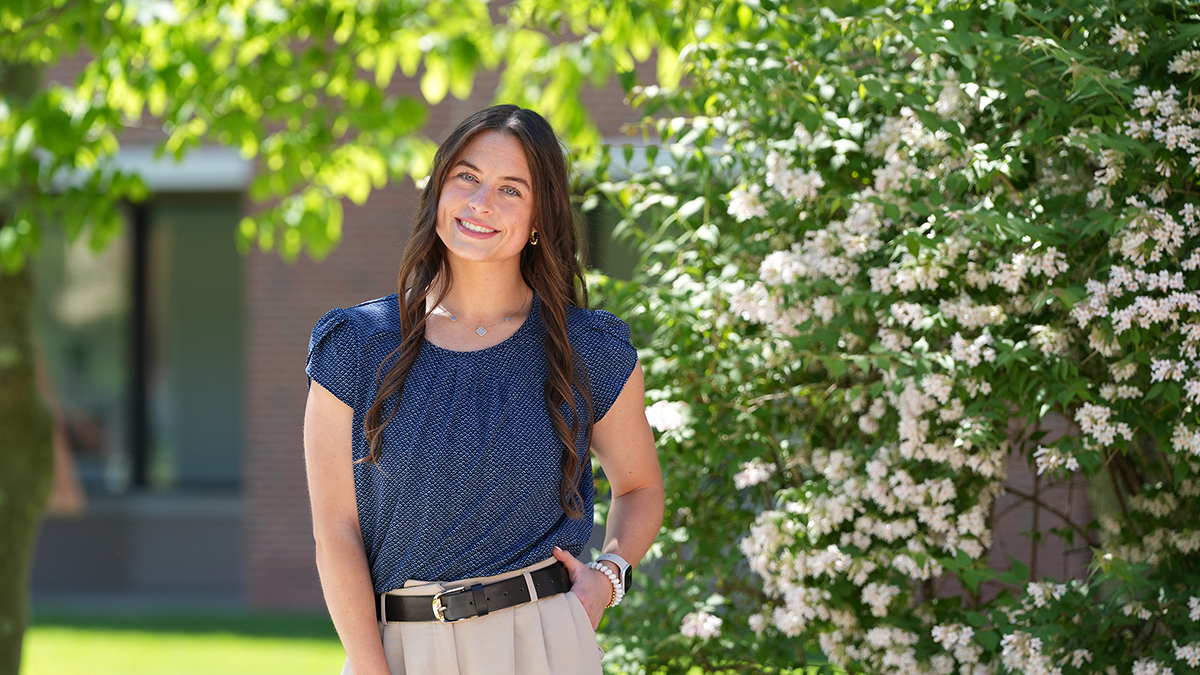Tuesday, May 13, 2025
Allison Stewart has been accepted into Cornell’s biological and environmental engineering master’s program
by Adam Grybowski

For an environmental science major, Allison Stewart harbors a career ambition that, at first, may sound quite illogical.
“It would be great to work with one of the top polluters in the world,” she says.
Stewart understands how counterintuitive that sounds. Explaining her thinking during a recent interview, she continues, “But if you’re the person striving to help a large company make big decisions on sustainability, that can have a big impact.”
Upon graduating from Rider University in May, Stewart is looking ahead to continuing her internship this summer with AstraZeneca in its safety, health, and environment department and then entering a one-year master’s program at Cornell in biological and environmental engineering. A Lester B. Knight Scholarship awardee from Cornell, she will also be able to pursue an MBA after she completes her engineering master’s.
These steps are part of her larger plan to contribute to innovation that will meaningfully address major sustainability challenges she has studied in detail.
“A lot of environmental science is describing what humans are doing that is bad,” she says. “I constantly found myself sitting there in class thinking about these defined problems we have, and though the challenges are daunting, I kept finding myself getting really excited.”
That excitement stems from her optimism that human ingenuity can create a better future. During meetings at AstraZeneca, she has felt drawn to the problem-solving skills of the company’s engineers. The experience opened her eyes to individuals inside a multinational company working to tackle complex issues.
“I feel like there’s a real need for solutions and positive change and that’s the driver of wanting to get an engineering degree, because it is focused on solutions,” says Stewart.
I feel like there’s a real need for solutions and positive change and that’s the driver of wanting to get an engineering degree, because it is focused on solutions."
Drawn to understanding how the world works, Stewart has long known she wanted to study science. Originally from Lower Merion, Pennsylvania, she was recruited to swim at Rider and earned a full-tuition scholarship. Four years later, she has established herself as a competitive student-athlete while conducting significant scientific research.
For the past three years, she has worked with Professor Daniel Druckenbrod, Ph.D., on a multi-university project generating data about how the climate has changed in Southeast Asia over the past 500 to 1,000 years. Druckenbrod’s research centers around measuring tree rings to make inferences about past events.
After observing a stress response in trees called traumatic resin ducts, Stewart used that as the basis for her senior thesis and Baccalaureate Honors Program project. This spring, she presented her research at the Mid-Atlantic Ecological Society of America Meeting at Longwood Gardens, where her poster won third place in the undergraduate category.
“It was such a unique opportunity,” she says. “I know plenty of undergrads who are studying science, but not many who have gotten to work with these global and international samples. I didn’t come into college thinking that I have to study trees, but it opened up that world of science to me.”
Stewart also made a startling discovery while conducting research with Dr. Hongbing Sun, who specializes in hydrology. Leveraging data from the National Oceanic and Atmospheric Administration, she found that land is sinking in four counties of southern New Jersey due to groundwater being pumped out.
“I was able to project that after 100 years the land will have sunk 10 millimeters," she says. “That might not sound like much, but it will be more consequential when combined with sea level rise because of climate change.”
Nearing graduation, Stewart has found fulfillment in the pursuit of her goals, even in spite of the demanding nature of her studies and athletic commitments.
“It’s hard sometimes,” she says. “The exams are hard. The labs are long. Swim team is a lot of 5 a.m. wakes up. But it was all worth it.”
